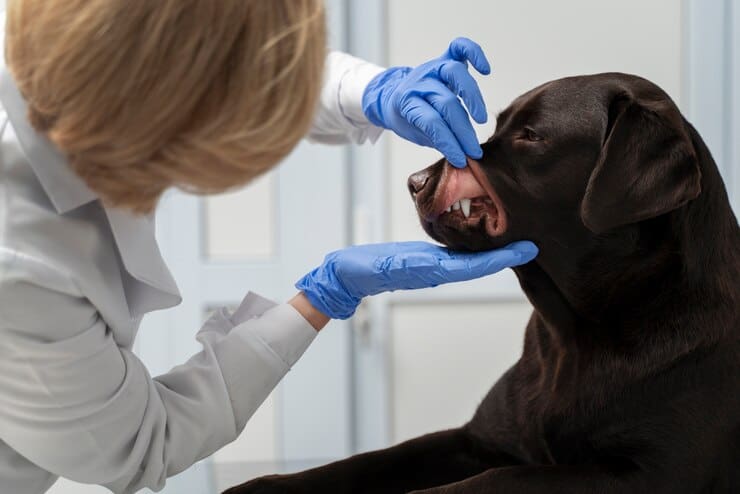From playful puppyhood to the dignified years of adulthood, our canine companions rely on their teeth for everything from chewing toys to maintaining their overall health. But what exactly constitutes healthy dog teeth, and when should we be concerned about the need for dental extractions in your dog?
Understanding Canine Dental Development
The journey of canine dental health begins in puppyhood. Just like humans, puppies are born without teeth, but their baby (deciduous) teeth begin to erupt around three to four weeks of age. By the time they reach eight weeks, most puppies will have a full set of baby teeth, totalling 28 in all.
As puppies grow, their baby teeth make way for permanent (adult) teeth, a teething process just like us! The transition from puppy teeth to adult teeth typically occurs between four and six months of age. Adult dogs have 42 teeth, including incisors, canines, premolars, and molars, each serving a specific function in biting, tearing, and chewing.
Signs Of Healthy Canine Teeth
Regular dental care, including brushing and professional cleanings, can help maintain your dog’s oral health and prevent the need for extractions. Healthy dog teeth should exhibit the following characteristics:
- Clean Appearance: Healthy teeth are free from tartar buildup, discoloration, or visible damage.
- Firm Gums: Pink, firm gums indicate good oral health; while red, swollen gums may signal inflammation or infection.
- Normal Bite Alignment: Proper bite alignment, especially of the big canine (fang) teeth ensures even wear on the teeth and minimises the risk of dental issues and oral pain during development.
- Non-Erupting Teeth: Some teeth don’t develop, which is more common than you think, and usually causes no problems. However, some teeth develop and never erupt above the gumline. These teeth can develop a cyst around them which, if left undiagnosed, can enlarge and destroy the surrounding bone. Ask your vet to count out the teeth when your puppy is in for anaesthesia and x-ray the mouth if any are missing. This is something we regularly check in consultation, especially in puppy bite assessment consultations. With time and patience (and treats) we can usually assess the number of teeth without anaesthesia.
When Are Dental Extractions Necessary?
Despite our best efforts, dental issues can still arise in dogs. Common reasons for dental extractions include:
- Periodontal Disease: Periodontal disease is the buildup of plaque and tartar on the teeth, and results in pain and infection. Even mild periodontal disease can destroy enough of the gum and bone that hold a tooth in place that it becomes better for the dog to have the tooth removed.
At Sydney Pet Dentistry we x-ray mouths to assess the level of periodontal disease. It is very common for many teeth to be affected (and need removal) once you have good quality x-rays and experienced interpretation.
- 2. Trauma Or Injury: Accidents or trauma can result in fractured or dislodged teeth, which may need to be extracted to prevent infection or discomfort.
- Stomatitis: Dogs and cats suffer from stomatitis, which is a severe and incredibly painful inflammation of the gum and oral tissue. The teeth are central to this disease and dental extraction of all the dog’s teeth is usually required.
- Malocclusions: If a puppy has an abnormal bite alignment we might need to shift the direction the teeth are growing. If diagnosed early this can sometimes be treated with ball therapy. Other patients need more advanced dental care. Sydney Pet Dentistry does bite assessment consultations, especially in puppies.
It’s essential to consult with a veterinarian if you notice any signs of dental problems in your dog, such as bad breath, difficulty eating, or swelling around the mouth.
Maintaining healthy teeth is crucial for the overall well-being of our canine companions. By understanding what constitutes healthy canine teeth and recognising the signs that dog dental extractions may be necessary, we can ensure our pets enjoy a lifetime of optimal oral health. Remember to schedule regular dental check-ups with your veterinarian to prioritise dental care as part of your dog’s wellness routine. Get in touch with Sydney Pet Dentistry to schedule an appointment!


